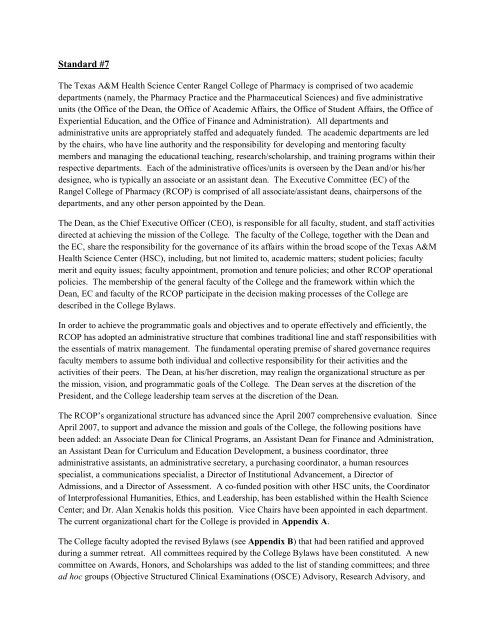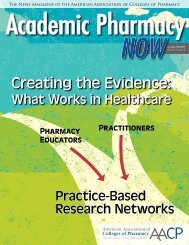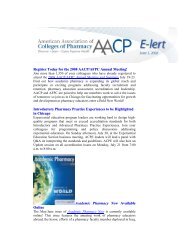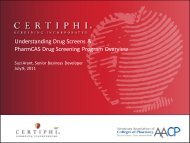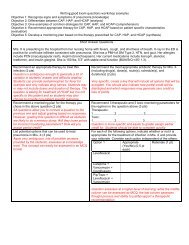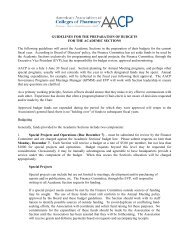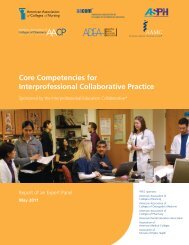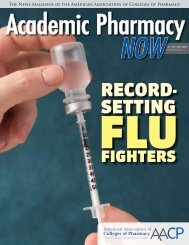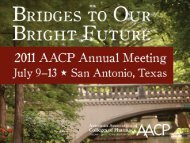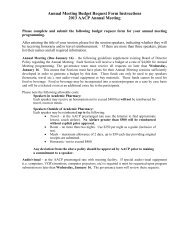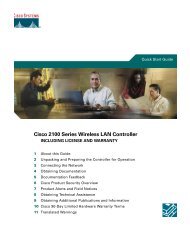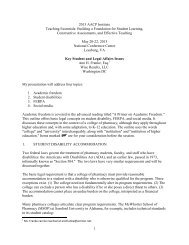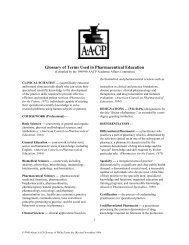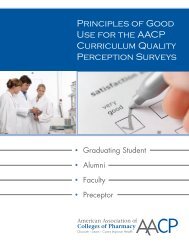Note-Worthy Practice - Texas A and M HSC Rangel COP.pdf - AACP
Note-Worthy Practice - Texas A and M HSC Rangel COP.pdf - AACP
Note-Worthy Practice - Texas A and M HSC Rangel COP.pdf - AACP
Create successful ePaper yourself
Turn your PDF publications into a flip-book with our unique Google optimized e-Paper software.
St<strong>and</strong>ard #7<br />
The <strong>Texas</strong> A&M Health Science Center <strong>Rangel</strong> College of Pharmacy is comprised of two academic<br />
departments (namely, the Pharmacy <strong>Practice</strong> <strong>and</strong> the Pharmaceutical Sciences) <strong>and</strong> five administrative<br />
units (the Office of the Dean, the Office of Academic Affairs, the Office of Student Affairs, the Office of<br />
Experiential Education, <strong>and</strong> the Office of Finance <strong>and</strong> Administration). All departments <strong>and</strong><br />
administrative units are appropriately staffed <strong>and</strong> adequately funded. The academic departments are led<br />
by the chairs, who have line authority <strong>and</strong> the responsibility for developing <strong>and</strong> mentoring faculty<br />
members <strong>and</strong> managing the educational teaching, research/scholarship, <strong>and</strong> training programs within their<br />
respective departments. Each of the administrative offices/units is overseen by the Dean <strong>and</strong>/or his/her<br />
designee, who is typically an associate or an assistant dean. The Executive Committee (EC) of the<br />
<strong>Rangel</strong> College of Pharmacy (R<strong>COP</strong>) is comprised of all associate/assistant deans, chairpersons of the<br />
departments, <strong>and</strong> any other person appointed by the Dean.<br />
The Dean, as the Chief Executive Officer (CEO), is responsible for all faculty, student, <strong>and</strong> staff activities<br />
directed at achieving the mission of the College. The faculty of the College, together with the Dean <strong>and</strong><br />
the EC, share the responsibility for the governance of its affairs within the broad scope of the <strong>Texas</strong> A&M<br />
Health Science Center (<strong>HSC</strong>), including, but not limited to, academic matters; student policies; faculty<br />
merit <strong>and</strong> equity issues; faculty appointment, promotion <strong>and</strong> tenure policies; <strong>and</strong> other R<strong>COP</strong> operational<br />
policies. The membership of the general faculty of the College <strong>and</strong> the framework within which the<br />
Dean, EC <strong>and</strong> faculty of the R<strong>COP</strong> participate in the decision making processes of the College are<br />
described in the College Bylaws.<br />
In order to achieve the programmatic goals <strong>and</strong> objectives <strong>and</strong> to operate effectively <strong>and</strong> efficiently, the<br />
R<strong>COP</strong> has adopted an administrative structure that combines traditional line <strong>and</strong> staff responsibilities with<br />
the essentials of matrix management. The fundamental operating premise of shared governance requires<br />
faculty members to assume both individual <strong>and</strong> collective responsibility for their activities <strong>and</strong> the<br />
activities of their peers. The Dean, at his/her discretion, may realign the organizational structure as per<br />
the mission, vision, <strong>and</strong> programmatic goals of the College. The Dean serves at the discretion of the<br />
President, <strong>and</strong> the College leadership team serves at the discretion of the Dean.<br />
The R<strong>COP</strong>’s organizational structure has advanced since the April 2007 comprehensive evaluation. Since<br />
April 2007, to support <strong>and</strong> advance the mission <strong>and</strong> goals of the College, the following positions have<br />
been added: an Associate Dean for Clinical Programs, an Assistant Dean for Finance <strong>and</strong> Administration,<br />
an Assistant Dean for Curriculum <strong>and</strong> Education Development, a business coordinator, three<br />
administrative assistants, an administrative secretary, a purchasing coordinator, a human resources<br />
specialist, a communications specialist, a Director of Institutional Advancement, a Director of<br />
Admissions, <strong>and</strong> a Director of Assessment. A co-funded position with other <strong>HSC</strong> units, the Coordinator<br />
of Interprofessional Humanities, Ethics, <strong>and</strong> Leadership, has been established within the Health Science<br />
Center; <strong>and</strong> Dr. Alan Xenakis holds this position. Vice Chairs have been appointed in each department.<br />
The current organizational chart for the College is provided in Appendix A.<br />
The College faculty adopted the revised Bylaws (see Appendix B) that had been ratified <strong>and</strong> approved<br />
during a summer retreat. All committees required by the College Bylaws have been constituted. A new<br />
committee on Awards, Honors, <strong>and</strong> Scholarships was added to the list of st<strong>and</strong>ing committees; <strong>and</strong> three<br />
ad hoc groups (Objective Structured Clinical Examinations (OSCE) Advisory, Research Advisory, <strong>and</strong>
Enterprise Risk <strong>and</strong> Opportunity Management) have been formed. Also, three st<strong>and</strong>ing committees were<br />
moved to ad hoc/advisory status: the Preceptor Advisory, Self-Study, <strong>and</strong> Support Services Committees.<br />
Accordingly, ten st<strong>and</strong>ing committees <strong>and</strong> seven advisory <strong>and</strong> ad hoc committees now exist to guide<br />
various aspects of the College. In addition, a community-driven Fund-raising Event Committee (FEC)<br />
was established to plan <strong>and</strong> execute an inaugural, major fundraising event for the College, the Silver Star<br />
Gala.<br />
The Dean continues to meet with the EC members <strong>and</strong> all directors, one-on-one, every quarter in their<br />
offices. These meetings have been productive, not only to assess needs, resources, challenges <strong>and</strong><br />
opportunities, but also to establish productive working relations for optimal programmatic outcomes as<br />
well.
<strong>Texas</strong> A&M Health Science Center Irma Lerma <strong>Rangel</strong> College of Pharmacy<br />
Organizational Structure<br />
Director for<br />
Institutional<br />
Advancement<br />
Dean<br />
Exec Asst to the<br />
Dean<br />
Communications<br />
Specialist<br />
Director of<br />
Assessment*<br />
Interim Assoc<br />
Dean<br />
Acad Affairs*<br />
Director of<br />
Instructional<br />
Tech<br />
Asst Dean<br />
Curr & Edu Dev<br />
Dept Chair<br />
Pharm Sciences<br />
Vice-Chair<br />
Pharm<br />
Sciences<br />
Director of<br />
Admissions<br />
Assoc Dean<br />
Stud Affairs<br />
Director<br />
Drug Info<br />
Center<br />
Dept Chair<br />
Pharm <strong>Practice</strong><br />
Vice-Chair<br />
Pharm <strong>Practice</strong><br />
Regional<br />
Coordinators<br />
Assoc Dean<br />
Clin Programs<br />
Director<br />
Exper Prog<br />
Director of<br />
Grad Studies<br />
Assoc Dean<br />
Res/Ext Affairs**<br />
Human<br />
Resources Spec<br />
Asst Dean<br />
Finance & Admin<br />
* Search currently underway Exec Committee<br />
** Position approved for FY 10 <strong>COP</strong> Admin Leadership Team<br />
Last updated: March 2010
Bylaws for Faculty Governance<br />
Table of Contents<br />
1. Preamble<br />
2. Organization<br />
3. Faculty Meetings<br />
4. Executive Committee<br />
5. Membership<br />
6. Policies Regarding College Committees<br />
7. College St<strong>and</strong>ing Committees<br />
7.1. Admissions<br />
7.2. APPE Review<br />
7.3. Appointment, Promotion <strong>and</strong> Tenure<br />
7.4. Awards, Honors, <strong>and</strong> Scholarships<br />
7.5. Clinical Focus Group<br />
7.6. Credentialing<br />
7.7. Curricular Affairs<br />
7.8. Faculty Development<br />
7.9. Library <strong>and</strong> Learning Resources<br />
7.10. Outcomes Assessment<br />
8. College Advisory <strong>and</strong> Ad-Hoc Committees<br />
8.1. OSCE Advisory<br />
8.2. Preceptor Advisory<br />
8.3. Research Advisory<br />
8.4 Self Study<br />
8.5. Support Services<br />
9. Special Committees <strong>and</strong> Boards<br />
9.1. EROM<br />
9.2. Dean’s National Advisory Board<br />
10. Revisions <strong>and</strong> Amendments of Bylaws
Bylaws (...continued) 2<br />
1. Preamble<br />
The faculty of the Irma Lerma <strong>Rangel</strong> College of Pharmacy (<strong>COP</strong> or College), together with the<br />
Dean <strong>and</strong> his/her administrative leadership team (ALT), share the responsibility for the<br />
governance of its affairs, including, but not limited to, academic matters; student policies; faculty<br />
merit <strong>and</strong> equity issues; faculty appointment, promotion <strong>and</strong> tenure policies; <strong>and</strong> other <strong>COP</strong><br />
operational policies. The Dean <strong>and</strong> the ALT are collectively referred to as the Executive<br />
Committee (EC) of the College.<br />
The purposes of this document are to define the membership of general faculty of the College<br />
<strong>and</strong> to provide a framework within which the EC <strong>and</strong> faculty of the <strong>COP</strong> participate in the<br />
decision making processes of the College. The overarching objective is to allow participation of<br />
faculty in formulating policies <strong>and</strong> procedures to effectively advance the mission <strong>and</strong> goals of the<br />
College.<br />
2. Organization<br />
The Dean, as the Chief Executive Officer (CEO), is responsible for all faculty, student, <strong>and</strong> staff<br />
activities directed at achieving the mission of the College. The College shall be comprised of<br />
two Departments (namely, the Pharmacy <strong>Practice</strong> <strong>and</strong> the Pharmaceutical Sciences) <strong>and</strong> key<br />
administrative, functional units (namely, the Office of the Dean, the Office of Academic Affairs,<br />
the Office of Student Affairs, the Office of Experiential Education, the Office of Research, <strong>and</strong><br />
the Office of Finance <strong>and</strong> Administration). The Dean, at his/her discretion, may realign the<br />
organizational structure as per the mission, vision, <strong>and</strong> programmatic goals of the College. The<br />
ALT is comprised of all associate/assistant deans, chairpersons of the departments, <strong>and</strong> any other<br />
person appointed by the Dean.<br />
All departments <strong>and</strong> administrative units shall hold regular meetings to address issues pertinent<br />
to their academic departments/administrative units. Minutes are taken at each departmental <strong>and</strong><br />
administrative unit meeting <strong>and</strong> kept as a permanent record of the department’s/unit’s activities<br />
in the Dean's office. At the department level, faculty input shall be sought on all major policies<br />
<strong>and</strong> procedures through formal discussions <strong>and</strong> debates.<br />
3. Faculty Meetings<br />
Meetings of College faculty shall be held in the fall <strong>and</strong> spring semesters each academic year.<br />
Additional faculty meetings may be convened at the discretion of the Dean or shall be called<br />
upon the request of one third of faculty members eligible to vote as per the criteria specified in<br />
Section 5. The Dean shall preside over all faculty meetings. In his/her absence, the Dean’s<br />
designee presides. The agenda of the meeting is set by the Dean in consultation with the Faculty<br />
Secretary, who is elected by the general faculty of the College. Election of the Faculty Secretary<br />
shall be for a two-year term beginning September 1 of the election year. This election shall be<br />
conducted at the faculty meeting in the spring semester.
Bylaws (...continued) 3<br />
College faculty meetings shall be governed by Robert’s Rules of Order, Newly Revised.<br />
(http://www.rulesonline.com/) A simple majority of the members shall constitute a quorum.<br />
The Faculty Secretary conducts a count for purposes of establishing a quorum at the beginning of<br />
the meeting.<br />
4. Executive Committee<br />
The Executive Committee (EC) shall be comprised of the Dean of the College, who shall serve<br />
as the Chair, <strong>and</strong> members of the College’s ALT. The Dean or his/her designee shall preside<br />
over all EC meetings.<br />
The EC serves to advise the Dean <strong>and</strong>, under his/her direction, shall establish administrative<br />
structure <strong>and</strong> responsibilities for the College <strong>and</strong> coordinate all faculty, student <strong>and</strong> staff<br />
activities required to fulfill the role <strong>and</strong> mission of the College. The EC is also responsible for<br />
reviewing all proposed actions arising from st<strong>and</strong>ing committees or other administration actions<br />
<strong>and</strong> for disseminating official Health Science Center <strong>and</strong> College communications to the faculty<br />
<strong>and</strong> staff, as appropriate. In addition, this Committee polls the faculty for their preferences in<br />
serving on committees; nominates <strong>and</strong> recommends membership composition for College<br />
committees; <strong>and</strong>, as necessary, makes recommendations to the Dean on the formation of new<br />
committees <strong>and</strong> the elimination of committees, which may no longer be necessary.<br />
The format of EC meetings may include: a) weekly tactical meetings to review weekly activities<br />
<strong>and</strong> resolve tactical issues; b) monthly strategic meetings to discuss strategies, develop plans,<br />
analyze, brainstorm <strong>and</strong> act on issues that are pertinent to the College’s mission <strong>and</strong> goals, <strong>and</strong> c)<br />
periodic review meetings (including leadership retreats <strong>and</strong> advances) to review strategy, team<br />
development, processes, <strong>and</strong> progress. At the request of the Dean, the College administrators<br />
(including directors) <strong>and</strong> st<strong>and</strong>ing committee chairs provide reports at the EC meetings. Minutes<br />
are maintained for all the EC meetings <strong>and</strong> are posted on the College’s website, as appropriate.<br />
5. Membership<br />
The general faculty of the <strong>COP</strong> shall consist of all individuals holding the appointment within<br />
the College to a tenure, tenure-track, non-tenure track, or adjunct position with the title of<br />
Professor, Associate Professor, Assistant Professor, or Instructor. Unless otherwise stated,<br />
reference to the “Faculty” in this document refers to the general faculty. The faculty<br />
membership of each College committee is confirmed by the Dean at the start of each academic<br />
year <strong>and</strong> the membership list on all committees shall be announced via email to the faculty <strong>and</strong><br />
posted on the College’s website.<br />
Generally, the term of membership for all committees shall be two years with approximately one<br />
half of the membership rotating off each year, serving staggered terms. Members are assigned to<br />
a committee no more than two consecutive terms; however, the Dean may reappoint a member to<br />
a committee longer than the two-term period. The ex officio, student <strong>and</strong>/or non-faculty<br />
members shall also be appointed by the Dean at the start of each academic year. In addition to
Bylaws (...continued) 4<br />
an appointed ex officio member on any committee, the Dean serves as an ex officio member on<br />
all committees, st<strong>and</strong>ing <strong>and</strong> ad hoc.<br />
Faculty holding at least a 0.50 Full Time Equivalent (FTE) appointment with the College at the<br />
rank of instructor or above shall be voting members of the faculty of the College of Pharmacy.<br />
All actions of the faculty, with the exception of revisions <strong>and</strong> amendments of the Bylaws, require<br />
an affirmative vote by a majority of the voting members. The Faculty Secretary shall maintain a<br />
list of voting members of the faculty. Ex officio members serve without vote, unless otherwise<br />
specified by the Dean.<br />
6. Policies Regarding College Committees<br />
In order to realize the mission, vision, <strong>and</strong> specific goals of the <strong>COP</strong> <strong>and</strong> to advance the<br />
programmatic objectives, the Dean may institute/appoint st<strong>and</strong>ing, ad hoc or advisory, <strong>and</strong><br />
special committees <strong>and</strong> Boards, task forces, working groups, or other entities, as deemed<br />
necessary.<br />
In addition to the EC, several st<strong>and</strong>ing committees are maintained to represent the College<br />
faculty organization in the governance of their affairs <strong>and</strong> to state <strong>and</strong> advance faculty interests<br />
pertaining to the mission, role <strong>and</strong> functions of the College. The Dean shall appoint st<strong>and</strong>ing<br />
committees in accordance with these Bylaws. Faculty, through participation in these<br />
committees, shall be engaged in setting priorities <strong>and</strong> directions for the College. Memberships<br />
on st<strong>and</strong>ing committees shall be appointed by the Dean from recommendations <strong>and</strong> nominations<br />
submitted by the EC. The College shall try to maintain equitable representation of faculty<br />
members from each of the two departments, where applicable. The recommended size of<br />
membership will be instituted when the College faculty size reaches steady state or when the<br />
professional program completes five years in operation, whichever occurs first.<br />
All st<strong>and</strong>ing committees shall keep <strong>and</strong> approve minutes of meetings <strong>and</strong> business. The chair of<br />
each committee shall be responsible for the timely preparation of the minutes. Following<br />
approval by committee membership, minutes shall be distributed to the Office of the Dean<br />
through the committee chair or another person appointed by the committee within one week of<br />
the meeting. When such minutes include a specific recommendation or policy for faculty<br />
consideration, the Dean shall route it to the EC for its action on the st<strong>and</strong>ing committee<br />
recommendations. If a new recommendation or policy is accepted, the Dean shall bring it to the<br />
general faculty meeting for approval <strong>and</strong> ratification by a majority vote.<br />
A quorum for st<strong>and</strong>ing committees shall consist of a simple majority of the committee’s voting<br />
membership. The chairperson of each of the st<strong>and</strong>ing committees shall be appointed by the Dean<br />
or elected annually by majority vote of the official committee membership at the first meeting of<br />
the academic year. Each committee chairperson will be responsible for seeing that the<br />
committee carries out its assigned duties as communicated by the Dean. Each committee<br />
(st<strong>and</strong>ing or ad hoc) will submit an end-of-the-year report to the Office of the Dean by August 1.<br />
The College then generates a written annual report, which is made available to all faculty<br />
members.
Bylaws (...continued) 5<br />
All st<strong>and</strong>ing committees shall have their first meeting by October 15 of each year, must meet at<br />
least twice per year, <strong>and</strong> may meet more frequently if the committee business so indicates. The<br />
Dean <strong>and</strong> all committee chairs meet in the spring every year to discuss <strong>and</strong> develop<br />
recommendations for charges for the subsequent academic year. The Dean, after ratification by<br />
the EC, shall bring the recommendations to the faculty for their ratification. A simple majority<br />
vote is required for passage.<br />
7. College St<strong>and</strong>ing Committees<br />
A list of st<strong>and</strong>ing committees for the College is as follows:<br />
1. Admissions<br />
2. APPE Review<br />
3. Appointment, Promotion <strong>and</strong> Tenure<br />
4. Awards, Honors, <strong>and</strong> Scholarships<br />
5. Clinical Focus Group<br />
6. Credentialing<br />
7. Curricular Affairs<br />
8. Faculty Development<br />
9. Library <strong>and</strong> Learning Resources<br />
10. Outcomes Assessment<br />
Charges (functions), composition, <strong>and</strong> reporting of the st<strong>and</strong>ing committees in the College<br />
follow.<br />
7.1. Admissions Committee<br />
Charge: The Admissions Committee is charged with matters related to admissions to the College<br />
of Pharmacy, including determining the criteria/st<strong>and</strong>ards for selection, setting guidelines for<br />
interviewing, <strong>and</strong> evaluating criteria for all students applying for admission or readmission. This<br />
Committee regularly reviews admissions policies <strong>and</strong> recommends appropriate changes. The<br />
Committee may also assist the Associate Dean for Student Affairs in designing application<br />
materials, improving the efficiency <strong>and</strong>/or effectiveness of the admissions process, evaluating the<br />
on-site written essay, <strong>and</strong> serving as substitute interviewers as needed.<br />
Membership: This Committee shall consist of five faculty members, a practicing, non-faculty<br />
pharmacist, a pharmacy student from each of the professional classes, <strong>and</strong> the Director of<br />
Admissions as ex officio member.<br />
Reports: to the Dean through the Associate Dean for Student Affairs<br />
7.2. APPE Review Committee<br />
Charge: The main purpose of the Advanced Pharmacy <strong>Practice</strong> Experiential (APPE) Review<br />
Committee is to foster the highest quality experiential education in the professional program <strong>and</strong>,
Bylaws (...continued) 6<br />
specifically, to review <strong>and</strong> recommend policies regarding: a) practice site st<strong>and</strong>ards <strong>and</strong><br />
development, b) preceptor st<strong>and</strong>ards <strong>and</strong> development, <strong>and</strong> c) student st<strong>and</strong>ards <strong>and</strong><br />
development.<br />
Membership: This Committee shall be comprised of five faculty members, two student<br />
representatives, two preceptors, <strong>and</strong> the Associate Dean for Clinical Programs as ex officio<br />
member.<br />
Reports: to the Dean through the Associate Dean for Clinical Programs<br />
7.3. Appointment, Promotion <strong>and</strong> Tenure Committee<br />
Charge: The Appointment, Promotion <strong>and</strong> Tenure (APT) Committee is charged with evaluating<br />
faculty seeking appointment, promotion <strong>and</strong> tenure in the College at the level of associate<br />
professor <strong>and</strong> professor, including all adjunct faculty seeking appointment <strong>and</strong> promotion. This<br />
Committee will annually assure the College is in compliance with the <strong>Texas</strong> A&M Health<br />
Science Center Faculty H<strong>and</strong>book. The APT Committee is also charged with establishing a<br />
process in the College to insure that a formal review of each faculty member's professional<br />
progress is completed periodically, a review which, along with the annual performance review,<br />
shall be considered in promotion <strong>and</strong> tenure decisions.<br />
Membership: The APT Committee shall consist of five faculty members <strong>and</strong> an administrative<br />
representative who serves as ex officio member.<br />
Reports: to the Dean<br />
7.4. Awards, Honors, <strong>and</strong> Scholarships Committee<br />
Charge: The Awards, Honors, <strong>and</strong> Scholarships Committee is primarily charged with<br />
establishing the criteria for the awards <strong>and</strong> honors for the faculty <strong>and</strong> students of the College.<br />
The Committee is further charged with establishing criteria for student scholarships, when<br />
necessary, <strong>and</strong> making recommendations for administering already existing scholarships in the<br />
College.<br />
Membership: The Awards, Honors, <strong>and</strong> Scholarships Committee shall consist of three faculty<br />
members <strong>and</strong> the Associate Dean for Student Affairs serving as an ex officio member.<br />
Reports: to the Dean<br />
7.5. Clinical Focus Group Committee<br />
Charge: The Clinical Focus Group Committee is responsible for setting criteria for<br />
establishing/maintaining clinical training sites <strong>and</strong> recruiting qualified preceptors for the College<br />
in accordance with its experiential educational program. This Committee reviews <strong>and</strong> revises the<br />
clinical training program, goals <strong>and</strong> objectives, quality assurance guidelines <strong>and</strong> professional
Bylaws (...continued) 7<br />
performance measures in accordance with the accreditation st<strong>and</strong>ards <strong>and</strong> guidelines <strong>and</strong> other<br />
documents adopted by national professional organizations.<br />
Membership: This Committee shall consist of the Associate Dean for Clinical Programs, the<br />
Chair of the Department of Pharmacy <strong>Practice</strong>, the Director of Experiential Programs, two<br />
clinical faculty members, a student, <strong>and</strong> two practitioners from pharmacy <strong>and</strong> other health<br />
sciences.<br />
Reports: to the Dean<br />
7.6. Credentialing Committee<br />
Charge: The primary functions of the Committee are to: a) review the academic <strong>and</strong> professional<br />
performance of all professional students each academic term (including benchmarks); b) make<br />
appropriate recommendations on students with academic deficiencies; c) act on academic <strong>and</strong><br />
professional issues of students, including probations, suspensions, <strong>and</strong> dismissal, in accordance<br />
with College policies; d) review <strong>and</strong> act on student cases of academic dishonesty; e) hear <strong>and</strong> act<br />
on petitions from students who request variation from any academic policy; f) recommend for<br />
progression students who have satisfactory achievement each semester; <strong>and</strong> g) recommend for<br />
graduation students who have completed degree requirements. This Committee makes<br />
recommendations to the Dean regarding student appeals <strong>and</strong> may also assist him/her in making<br />
the policy recommendations pertaining to academic st<strong>and</strong>ards, retention, <strong>and</strong> progression.<br />
Membership: The Credentialing Committee shall consist of three faculty members, the<br />
department chairs, <strong>and</strong> an administrative representative as an ex officio member.<br />
Reports: to the Dean through the Associate Deans for Academic <strong>and</strong> Student Affairs<br />
7.7. Curricular Affairs Committee<br />
Charge: The Curricular Affairs Committee is charged with the continual monitoring <strong>and</strong> revision<br />
of the professional pharmacy curriculum. The responsibilities of the Committee also include<br />
review of the individual course offerings on a regular basis to ensure that each course meets the<br />
goals <strong>and</strong> objectives established for the course offering, review of proposals for new courses,<br />
course deletions, <strong>and</strong> changes in sequence. This Committee also brings recommended<br />
curriculum revisions to the faculty for approval. Working in concert with the Outcomes<br />
Assessment Committee, it provides direction for needed programmatic changes. Furthermore,<br />
this Committee provides advice on interdisciplinary educational needs <strong>and</strong> opportunities in the<br />
health sciences.<br />
Membership: The Curriculum Committee shall consist of six faculty members, one student from<br />
each professional class, one practicing, non-faculty pharmacist member, <strong>and</strong> an administrative<br />
member serving as ex officio member.<br />
Reports: to the Dean through the Associate Dean for Academic Affairs
Bylaws (...continued) 8<br />
7.8. Faculty Development Committee<br />
Charge: The Faculty Development Committee is charged with developing activities <strong>and</strong> services<br />
that support faculty development <strong>and</strong> enable faculty to achieve excellence in scholarship <strong>and</strong><br />
teaching. The Committee is also responsible for making recommendations that enhance/promote<br />
the intellectual life <strong>and</strong> scholarly culture of the College.<br />
Membership: The Faculty Development Committee shall consist of four faculty members <strong>and</strong> an<br />
administrative member as an ex officio member.<br />
Reports: to the Dean<br />
7.9. Library <strong>and</strong> Learning Resources Committee<br />
Charge: The Library <strong>and</strong> Learning Resources Committee will make recommendations to the EC<br />
pertaining to access <strong>and</strong> acquisition of learning, library <strong>and</strong> drug information resources. This<br />
Committee also makes recommendations regarding library use, collection, <strong>and</strong> library services<br />
related to the educational, clinical service, <strong>and</strong> research missions of the College of Pharmacy.<br />
The Committee also provides advice on the development of policies <strong>and</strong> resources for the Health<br />
Sciences Libraries.<br />
Membership: The Library <strong>and</strong> Learning Resources Committee shall consist of two faculty<br />
members representing the basic <strong>and</strong> clinical sciences, two students, a staff member from library<br />
services, a pharmacy practitioner (a faculty member or preceptor), the Director of the Drug<br />
Information Center, the Director of Instructional Technology, <strong>and</strong> an administrative member.<br />
Reports: to the Dean<br />
7.10. Outcomes Assessment Committee<br />
Charge: The Outcomes Assessment Committee is primarily charged with developing a<br />
systematic approach to measuring student learning outcomes. It is also responsible for the<br />
continual monitoring <strong>and</strong> assessment of the professional pharmacy program for the purpose of<br />
ongoing quality improvement <strong>and</strong> student learning enhancement. This Committee deals with all<br />
matters of assessment, such as a) overseeing the development <strong>and</strong> implementation of the<br />
assessment program, including benchmark assessments, b) compilation <strong>and</strong> interpretation of<br />
various assessment data, c) assisting the Director of Assessment in preparing the annual<br />
assessment report, <strong>and</strong> d) facilitating information for self study reports to ensure compliance with<br />
SACS <strong>and</strong> ACPE requirements.<br />
Membership: The Outcomes Assessment Committee shall consist of four faculty members, two<br />
pharmacy students, a preceptor, a staff representative, <strong>and</strong> an administrative member serving as<br />
an ex officio member.<br />
Reports: to the Dean
Bylaws (...continued) 9<br />
8. College Advisory <strong>and</strong> Ad Hoc Committees<br />
Any advisory or ad hoc committees may be formed as the need occurs by a majority vote of the<br />
faculty <strong>and</strong> consent of the Dean or created for a specific purpose <strong>and</strong> timeframe by the Dean. Ex<br />
officio members to any of the advisory or ad hoc committees may be appointed by the Dean.<br />
The length of the terms of membership for all advisory <strong>and</strong> ad hoc committees is for not more<br />
than two years; <strong>and</strong>, at the discretion of the Dean, members may be re-appointed.<br />
8.1. Objective Structured Clinical Evaluations Advisory Committee<br />
Charge: The primary charges of the Objective Structured Clinical Evaluations Committee<br />
(OSCE) are to develop expertise in the OSCE method, to develop resources on the process, to<br />
transmit this information to the faculty, <strong>and</strong> to make recommendations on all OSCE-related<br />
matters, including resource needs <strong>and</strong> implementation strategies, to the Dean.<br />
Membership: The Objective Structured Clinical Evaluations Advisory Committee shall consist of<br />
an appropriate number of faculty members, at the discretion of the Dean.<br />
Reports: to the Dean<br />
8.2. Preceptor Advisory Committee<br />
Charge: The main functions of the Preceptor Advisory Committee are to participate in the<br />
planning of the preceptor conferences <strong>and</strong> their development, to counsel the Dean on preceptor<br />
needs, <strong>and</strong> to provide feedback through the Dean to the Executive Committee on all<br />
opportunities <strong>and</strong> activities pertaining to the College preceptors.<br />
Membership: The Preceptor Advisory Committee shall be comprised of appropriate number of<br />
preceptors from various clinical sites, who are appointed by the Dean with recommendations<br />
from the Director of Experiential Programs <strong>and</strong> the Associate Dean for Clinical Programs.<br />
Reports: to the Dean through the Associate Dean for Clinical Programs<br />
8.3. Research Advisory Committee<br />
Charge: The main function of the Research Advisory Committee (RAC) will be to advise the<br />
College on all matters related to the research programs, graduate education, infrastructure, <strong>and</strong><br />
mission of the College of Pharmacy as it relates to research.<br />
Membership: The Research Advisory Committee shall be comprised of an appropriate number of<br />
faculty <strong>and</strong> administrative members, at the discretion of the Dean.<br />
Reports: to the Dean<br />
8.4. Self Study Committee<br />
Charge: The primary charge of this Committee is to oversee the College’s self study process to<br />
systematically assess <strong>and</strong> document all College activities in accordance with the current ACPE
Bylaws (...continued) 10<br />
<strong>and</strong> SACS accreditation st<strong>and</strong>ards. Responsibilities also include responding to specific requests<br />
from ACPE <strong>and</strong> SACS for progress reports, including documentation, in order to maintain the<br />
accreditation of the College, as well as coordinating the Self Study Reports necessary for reaccreditation<br />
visits.<br />
Membership: The Self Study Committee shall consist of an appropriate size membership<br />
representing faculty, administration, preceptors, staff <strong>and</strong> students.<br />
Reports: to the College faculty through the Dean<br />
8.5. Support Services Committee<br />
Charge: The College Support Services Committee is charged with periodic assessment of needs<br />
for support services <strong>and</strong> making appropriate recommendations to the Dean pertaining to the<br />
College’s services <strong>and</strong> functions. This Committee is also charged with assessing the needs <strong>and</strong><br />
utilization of technology equipment, services, <strong>and</strong> training for education <strong>and</strong> research.<br />
Membership: The College Support Services Committee shall be comprised of representatives<br />
from information technology, multimedia services, the Drug Information Center, library services,<br />
student services, <strong>and</strong> other representatives as needed. The representation of student <strong>and</strong> faculty<br />
members shall be considered. An administrative member will serve on this Committee as an ex<br />
officio member.<br />
Reports: to Dean through the Assistant Dean for Finance & Administration<br />
9. Special Committees <strong>and</strong> Boards<br />
9.1. Enterprise Risk <strong>and</strong> Opportunity Management Committee<br />
Charge: The main function of the Enterprise Risk <strong>and</strong> Opportunity Management Committee<br />
(EROM) is to improve efficiency <strong>and</strong> effectiveness of all College operations to better meet the<br />
College’s mission <strong>and</strong> goals <strong>and</strong> to create a culture of compliance within the Health Science<br />
Center. Responsibilities of the Committee include facilitating the dissemination of information<br />
regarding the purpose <strong>and</strong> basics of EROM throughout the College; identifying <strong>and</strong> prioritizing<br />
critical risks spanning the entire organization; preparing a Risk Response Table for the <strong>HSC</strong><br />
EROM Steering Committee; <strong>and</strong> evaluating annually the component <strong>and</strong> institutional EROM<br />
process, making recommendations regarding its effectiveness <strong>and</strong> efficiency as appropriate.<br />
Membership: The Enterprise Risk <strong>and</strong> Opportunity Management Committee shall be comprised<br />
of an associate/assistant dean who will serve as chair, two or three other College administrators,<br />
two or three faculty members, <strong>and</strong> one or two students, or as deemed appropriate by the Dean.<br />
Reports: to the Dean
Bylaws (...continued) 11<br />
9.2. Dean’s National Advisory Board<br />
Charge: The main functions of the Dean’s National Advisory Board shall be to assist the College<br />
in setting strategic priorities, identify the new directions <strong>and</strong> initiatives, help determine sources<br />
of new funds, develop strategic partnerships with constituencies, help the College fulfill its<br />
mission <strong>and</strong> achieve goals, <strong>and</strong> to provide feedback through the Dean to the Executive<br />
Committee.<br />
Membership: The Dean’s National Advisory Council shall be comprised of representatives from<br />
academic institutions, chain drug stores, pharmacy associations, hospitals, independent<br />
pharmacists, drug companies, federal <strong>and</strong> regulatory agencies, <strong>and</strong> community leaders at-large.<br />
Reports: to the Dean<br />
10. Revisions <strong>and</strong> Amendments of Bylaws<br />
The Bylaws for Faculty Governance shall be reviewed at least every five years by an appropriate<br />
committee convened by the Dean <strong>and</strong>, after consultation with the EC, may recommend revisions<br />
<strong>and</strong> amendments to the Bylaws. The College faculty shall vote on the new Bylaws, <strong>and</strong> a two<br />
thirds majority vote is required for passage. The Faculty Secretary shall present all proposed<br />
amendments in writing to the general faculty at least a week (five business days) prior to the<br />
meeting. Recommended revisions or amendments will be reviewed by the Chief Legal Officer,<br />
<strong>Texas</strong> A&M Health Science Center. After review by the Chief Legal Officer, the President or<br />
his/her designee may approve revisions or amendments <strong>and</strong>, in consultation with the College of<br />
Pharmacy Dean, set the date upon which they will become effective.<br />
Adopted 9/11/09


